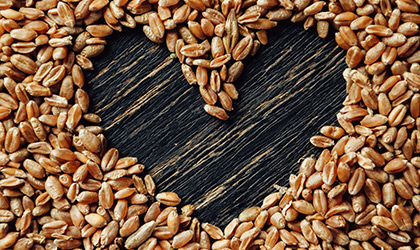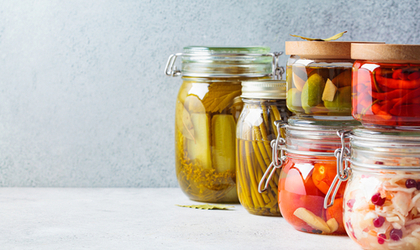
Good gut health means good overall health. And the secret is keeping our gut microbiome – the bustling community of bacteria, viruses, and fungi that live inside our digestive tract – happy. If we look after this ecosystem, it will look after us.
There are many ways to feed our gut: increasing fermented foods, eating mindfully, adding live cultures and even reducing stress. Research now suggests polyphenols, the natural compounds found in plant foods, are also an integral part of the gut health conversation (1).
What are polyphenols?
Polyphenols give plant foods their bright, vibrant colours. Colourful, natural, and packed with goodness, polyphenols are the micronutrients found in many plant foods and beverages.
These compounds have tremendous antioxidant potential, meaning they can neutralise harmful free radicals that would otherwise damage cells and increase the risk of health conditions and ageing (2).
What are the four types of polyphenols?
There are over 8,000 types of polyphenols in the natural world (3). Broadly speaking, polyphenols are divided into four groups:
-
Flavonoids: Quercetin, catechins, anthocyanidins, kaempferol, which are found in onions, apples, berries, green tea, grapes, and cocoa powder
-
Phenolic acids: Lignans and stilbenes, which are present in fruits, vegetables, seeds, and whole grains
-
Phenolic amides: Avenanthramides in oats and capsaicinoids in chilli peppers
-
Other polyphenols: Curcumin in turmeric, resveratrol in red wine, and lignans in sesame seeds, flaxseeds, and whole grains
What do polyphenols do to your body?
In essence, polyphenols are antioxidants that inhibit oxidation, a process that damages cell membranes and other structures. This process is known as oxidative stress, which is thought to lead to health conditions and contribute to the effects of ageing.
How do polyphenols support gut health?
Polyphenols can be described as nutritional rocket-fuel for the gut (4).
Polyphenols have a bidirectional relationship with the gut. In return for gut bacteria making polyphenols readily available for your body, these compounds feed the good gut bacteria, like Bifidobacterium (5). The polyphenols’ prebiotic effect encourages the bacteria to thrive and repopulate, improving the overall health of your gut (6).
The antioxidant qualities of polyphenols also make them promising candidates for managing some digestive conditions.
Polyphenols and the gut-brain axis
Since polyphenols help regulate the composition of your gut bacteria, they can also affect your mood and cognition, thanks to the gut-brain axis.
The gut-brain axis is the reciprocal relationship between the central nervous system and the gastrointestinal tract. That is to say, if you have a happy gut, you’ll have a happy mind.
The Smiles Trial (2017) was one of the most ground-breaking studies in the nutrition and mental health space, revealing the extent to which polyphenol-packed plant foods can support gut health and improve mood (7).
Researchers recruited participants with low mood and randomly assigned them to either social support or nutritional support for 12 weeks. Those in the nutritional support group were given a predominantly plant-based diet, while the other group received therapeutic support.
More than 30 per cent of those in the nutritional support group noticed a positive change in their mood – compared to 8 per cent of those in the social support group.
Polyphenols foods
Bacteria dwelling in the digestive tract have different taste buds and preferences. And since we have the power to shape this microbial community with food, eating a diverse diet is vital.
According to gut health expert, Professor Tim Spector, everyone should aim for 30 different plant foods weekly to support gut health (8). 30 may sound like a lot, but this number includes all plant foods: fruits, vegetables, whole grains, legumes, beans, nuts, seeds, herbs, and spices. Plus, it’s spread over seven days.
The more plant foods you eat, the more polyphenols you’ll consume, and the healthier your gut will be. Find more tips on how to improve gut health here.
Which foods are highest in polyphenols?
Berries
Strawberries, raspberries, blueberries, blackberries, and cranberries provide some of the most polyphenols in the natural world. Berries are rich in anthocyanidins – responsible for the vibrant colours of some fruits and vegetables – flavonols, and phenolic acids.
Cocoa
Cocoa powder is packed with polyphenols. Look for high-quality dark chocolate with 70% or greater cocoa content for the most polyphenols.
Is coffee full of polyphenols?
Coffee and black and green tea contain high levels of polyphenols. Research suggests organic coffee beans provide more polyphenols than regular ones (9).
Spices
Although we only use small amounts of spices in cooking, they’re still an excellent source of polyphenols.
Is turmeric a polyphenol?
Turmeric contains the polyphenol, curcumin, which continues to fascinate scientists and nutritional experts with its properties.
Easy ways to increase your polyphenol intake
-
Cook meals from scratch with real, whole foods
-
Keep mixed berries in the freezer
-
Snack on nuts and 70% dark chocolate
-
Add plenty of herbs and spices to food
-
Keep a jar of toasted mixed seeds in your kitchen and sprinkle them on dishes
-
Finish meals with a good glug of extra virgin olive oil
-
Swap meat for mixed beans in some dishes
-
Drink good quality red wine, coffee and tea in moderation
Want to learn more?
You can also read more about gut health here, or visit our health blog for more advice on your health and wellbeing. Alternatively, please get in touch with our team of expert Nutrition Advisors, who are on hand to provide free, confidential advice.
References:
-
Cardona F, Andrés-Lacueva C, Tulipani S, Tinahones FJ, Queipo-Ortuño MI. (2013) Benefits of polyphenols on gut microbiota and implications in human health. J Nutr Biochem. 24(8): 1415-1422.
-
Pham-Huy LA, He H, Pham-Huy C. (2008) Free radicals, antioxidants in disease and health. Int J Biomed Sci. 4(2): 89-96.
-
Pandey KB, Rizvi SI. (2009) Plant polyphenols as dietary antioxidants in human health and disease. Oxid Med Cell Longev. 2(5): 270-278.
-
Cory H, Passarelli S, Szeto J, Tamez M, Mattei J. (2018) The Role of Polyphenols in Human Health and Food Systems: A Mini-Review. Front Nutr. 5: 87.
-
Gwiazdowska D, Ju? K, Jasnowska-Ma?ecka J, Kluczy?ska K. (2015) The impact of polyphenols on Bifidobacterium growth. Acta Biochim Pol. 62(4): 895-901.
-
Filosa S, Di Meo F, Crispi S. (2018) Polyphenols-gut microbiota interplay and brain neuromodulation. Neural Regen Res. 13(12): 2055-2059.
-
Jacka, F.N., O’Neil, A., Opie, R. et al. (2017) A randomised controlled trial of dietary improvement for adults with major depression (the ‘SMILES’ trial). BMC Med 15, 23.
-
Horgan A. (2023) Nutrition for longevity: How diet can help you age healthily. Nutrition for Longevity: How Diet Can Help You Age Healthily. Available at: https://joinzoe.com/learn/nutrition-for-longevity
-
Król K, Gantner M, Tatarak A. (2020) The content of polyphenols in coffee beans as roasting, origin and storage effect. Eur Food Res Technol, 246, 33–39.
You Might Also Like

Olivia
Olivia Salter has always been an avid health nut. After graduating from the University of Bristol, she began working for a nutritional consultancy where she discovered her passion for all things wellness-related. There, she executed much of the company’s content marketing strategy and found her niche in health writing, publishing articles in Women’s Health, Mind Body Green, Thrive and Psychologies.
View More



